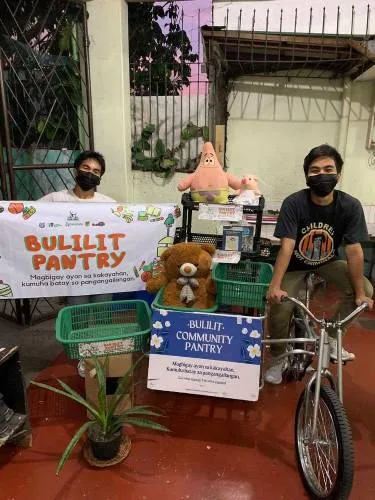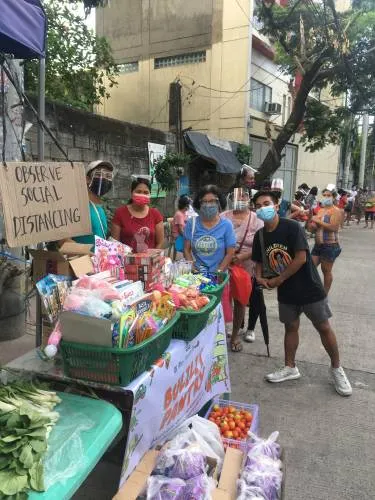The BULILIT “Undersized” Pantry
A Letter from Cathy Chang and Juan Lopez, serving in the Philippines
Subscribe to our co-worker letters
Dear friends,
As part of our partnership with the United Church of Christ in the Philippines, I (Juan Lopez (JL)) have been working with an organization that defends children’s rights, the Children Rehabilitation Center (CRC). I facilitated trainings and support for their volunteers and workers. During the pandemic CRC continued its outreach work including hosting a pantry for children. Here is my interview with Kim Vinzar Samania (KVS) about the “Bulilit” pantry.
JL: How did you get involved with Children Rehabilitation Center?
KVS: One of my friends told me CRC was looking for a Social Worker. I joined in June 2019. I am now both the Deputy Director and Social Worker.
JL: What is your relationship with the United Church of Christ in the Philippines?”
KVS: The UCCP churches have been a long-time partner of the CRC in defending children’s rights. Different activities include: hosting discussions or seminars about children’s rights; how to help communities; how the Church can respond to the psychosocial needs of the children in the community.

JL: What is the Bulilit pantry and how did it start?
KVS: Millions of Filipinos got pushed into wider hunger and poverty due the economic cataclysm of the pandemic. The Filipino people needed financial support not only from private entities but also from the government. The community food pantry in Maginhawa (https://www.presbyterianmission.org/story/bayanihan-is-the-spirit-of-sharing-in-the-philippines/) started this whole community food pantry movement. Our team of Children of the Storm already had an idea of making the community pantry inclusive of children. What if we could put a Bulilit (“undersized”) pantry so the community could also help the children. Our team concluded that we should put a small pantry for children in giving them toys, coloring books, coloring materials. Those books could since the [educational aspect of the kids’ lives] is very poor right now. Giving toys and coloring materials is a form of psychological support for children.
JL: What is the Task Force Children of the Storm?
KVS: The Task Force Children of the Storm (TFCoS), is a consortium of five different child-focused organizations: Children’s Rehabilitation Center (CRC), Salinlahi (“generation”) Alliance for Children’s Concerns, Association for the Rights of the Children South East Asia (ARCSEA), Batibot Early Learning Center and Parents Alternative on Early Childhood Care and Development Inc. (PAECCDI). In 2010, this consortium was formed in response of the devastation caused by the Typhoon Ondoy. TFCoS has been responding to more typhoons, floods and calamities in the Philippines, providing relief efforts to the children.
JL: How do you reach children since they cannot go out?
KVS: We are still trying to find ways for the Bulilit pantry to serve the children. We do not allow children to line up for the pantry. The parents do the work, so we don’t violate health protocols. We bought a tricycle to deliver door to door. Soon, we will be able to see if it is effective, we will be able to assess the system and see if it can be used for other partners and pantries. For now, we put our Bulilit pantry beside our partners’ pantries.

JL: How does the Anti-Terror Law of 2020 affect your work?
KVS: Before any food pantry started, CRC and its partners were very vocal about their opposition against the Anti-Terror Law because of its vague definition of terrorism. The CRC has been a victim of public vilification, red-tagging perpetrated by the state. During the pandemic, the CRC had to delay their distribution of goods because of the threats and difficulty to travel due to the pandemic restrictions. At the beginning of the pantry movement, the National Task Force- to End Local Communist Armed Conflict (NTF-ELCAC) already released statements tagging the organizers of the community pantry in Maginhawa as terrorists and communist pawns. They said that those pantries were led by the Communist Party, because they were too well organized to be coming only from regular citizens. Many community organizers have stopped providing help because of the vilification and threats. We had partners who stopped their operations because of too much fear.
JL: What is the most urgent issue about children in the Philippines in your opinion today?
KVS: This pandemic impacts on the body, mind, cognitive skills, education, development, and mental health of the children. The economic situation caused some families to engage in dangerous activities that threatens the welfare and rights of the children. There has been an increase in gender-based and domestic violence, as well as an exponential increase in sexual exploitation of the children. The policies in place were not ready for online teaching. There was much toll on the mental health state of the children. They were cases of suicides. Children have difficulty answering the modules, and [the need of computers for remote learning] added another economic struggle to the parents. There is a constant stress due to the state of education.
During these years of mission service, our family gratefully received your prayers and financial support. This funding is vital for our family. Please continue in your prayers and financial contributions.
Thank you for partnering with us in God’s mission.
In Christ, Juan Lopez and Cathy Chang
